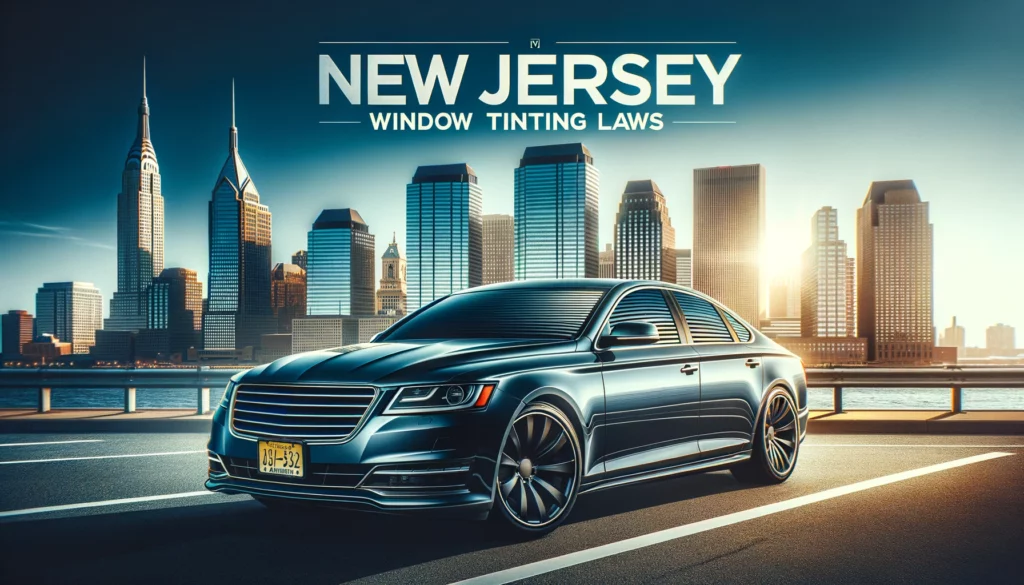Darkest legal tint for Sedans in New Jersey
- Windshield: No tint is allowed on the windshield.
- Front Side windows: No tint can be applied legally to this window.
- Back Side windows: Any darkness can be applied.
- Rear Window: Any darkness can be applied.
Darkest legal tint for SUV and Vans in New Jersey
- Windshield: No tint is allowed on the windshield.
- Front Side windows: No tint can be applied legally to this window.
- Back Side windows: Any darkness can be used.
- Rear Window: Any darkness can be used.
Please remember that these regulations are specific to sedan, SUVs and vans. It’s always a good idea to double-check with local law enforcement or DMV for the most current and accurate information.
New Jersey Tinting Regulations

New Jersey! The Garden State, known for its picturesque beaches, bustling cities, and… tinting regulations? That’s right! If you’re a car enthusiast or simply someone who values their privacy and comfort while driving, you might have considered getting your vehicle’s windows tinted. But before you head over to the nearest tint shop, it’s essential to familiarize yourself with New Jersey’s tinting regulations to ensure you’re on the right side of the law.
Understanding Visible Light Transmission (VLT)
Before diving into the specifics, let’s clarify a crucial term: Visible Light Transmission (VLT). VLT refers to the percentage of visible light that can pass through a window with tint. So, if a window has a VLT of 70%, it means 70% of the light can pass through, and it blocks out 30%. With this in mind, let’s explore the Garden State’s tinting guidelines.
Reflection and Appearance
New Jersey isn’t just about how dark your tint can be; it’s also about how it looks. The state prohibits windows from having a mirrored or metallic appearance. This means those shiny, reflective tints are a no-go in the Garden State.
Other Noteworthy Regulations
- Side Mirrors: If you’ve tinted your back window, you must have dual side mirrors. This ensures that drivers have adequate visibility behind them.
- Colors: Good news! No specific colors of tint are banned in New Jersey. So, whether you fancy a blue, green, or even a pink tint, you’re good to go.
- Medical Exemptions: For those with specific medical conditions that require added protection from sunlight, New Jersey does allow for medical exemptions. However, it’s essential to consult with New Jersey law to understand the terms of this exemption.
Penalties for Non-Compliance
Nobody likes penalties, especially when they can be avoided. In New Jersey, the penalties for non-compliance with tinting regulations can be steep. A first offense can result in a fine of up to $1,000, and for second or subsequent offenses, the fine can shoot up to $5,000.
Medical Exemptions for New Jersey Tint Laws

In New Jersey, you can have your vehicle’s windshield and/or front side windows tinted for medical reasons only. This means that if you or someone you know has a medical condition that requires reduced exposure to sunlight, you might be eligible for an exemption.
The Application Process
Navigating bureaucratic processes can be daunting, but fear not! Here’s a step-by-step guide to help you out:
- Start with the Application: Begin by completing the application titled “MVC Sunscreening 1”. You can request this application by emailing SUNSCREENING@mvc.nj.gov or by calling 609-984-2973. Ensure you follow all the instructions provided.
- Doctor’s Note: Part of the application requires your physician to fill out a section and provide a valid prescription. This is crucial as it verifies the medical necessity of the tint.
- Submission: Once completed, submit your application and the doctor’s prescription either via email to SUNSCREENING@mvc.nj.gov or by mail to: Customer Advocacy Office Attn: Sunscreening Exemption PO Box 403 Trenton, NJ 08666-0403
- Await Approval: If you qualify, the Customer Advocacy Office will send you a temporary approval form, valid for 60 days, along with a Sunscreening Installation Confirmation form.
- Get the Tint: With your temporary approval in hand, head to a licensed tinting facility in New Jersey. After the installation, the installer will need to fill out and sign the Sunscreening Installation Confirmation page.
- Keep Documents Handy: Always keep the temporary approval document in your vehicle. It’s your proof of exemption.
- Finalize the Process: Submit the completed Installation Confirmation page back to the Customer Advocacy Office using the contact details provided in step 3.
- Receive Permanent Approval: Once everything checks out, you’ll receive a permanent approval document, valid for 48 months. This document is essential and should be kept in your vehicle at all times. If you’re ever pulled over, it’s a good idea to show this document and, as a courtesy, roll down your windows.
- Renewal: Remember, the exemption isn’t forever. You’ll need to renew your Sunscreening document every 48 months using the “MVC Sunscreening 1” form.
Licensed Tinting Facilities
For your convenience, New Jersey maintains a list of licensed tinting facilities. Some of these include Andy’s Window Tint in Clifton, Electronic Environment in Lawrenceville, and Imagine Audio in Cherry Hill, among others.
Window Film Certificates and Stickers In New Jersey
First things first, why do we even need these certificates? Well, window tints aren’t just for aesthetics. They can help reduce glare, block harmful UV rays, and even improve privacy. However, there’s a fine line between a useful tint and one that’s potentially dangerous. Tints that are too dark can obscure a driver’s view, leading to potential road hazards. That’s where the state of New Jersey steps in, ensuring that all tints meet safety standards.
Getting Certified
So, how does one get their window film certified in New Jersey? It’s a straightforward process. Once you’ve had your windows tinted by a professional, they’ll provide you with a certificate. This certificate verifies that the tint meets New Jersey’s legal requirements. It’s essential to keep this certificate in your vehicle at all times, as you may need to show it to law enforcement if questioned.
Stickers: The Badge of Compliance
In addition to the certificate, vehicles with tinted windows in New Jersey must also display a sticker. This sticker, usually placed on the driver’s side window, indicates that the vehicle’s tint complies with state regulations. It’s a quick way for law enforcement to verify that your vehicle’s tint is up to code without having to check the certificate.
A Few Things to Remember
- Always ensure that your tint meets New Jersey’s legal requirements. It’s not just about avoiding a fine; it’s about ensuring safety on the road.
- Keep your window film certificate in your vehicle at all times. You never know when you might need it!
- If you’re considering getting your windows tinted, always go to a reputable professional. They’ll ensure that your tint meets state standards and provide you with the necessary certification.
Penalties or Ticket Cost for Illegal Window Tint in New Jersey

Before we delve into the costs, it’s essential to understand why these regulations exist in the first place. Window tints, while beneficial in many ways, can also pose safety risks. Overly dark tints can hinder a driver’s ability to see clearly, especially at night. Moreover, they can also make it difficult for law enforcement to see inside a vehicle, which can be a security concern. Hence, New Jersey, like many other states, has set specific limits on how dark your window tints can be.
The Costly Consequences
Now, let’s talk numbers. If you’re caught with illegal window tint in New Jersey, you can expect a ticket. But how much will it set you back? While the exact amount can vary based on the discretion of the ticketing officer and the degree of the violation, fines typically range from $100 to $1,000. Yes, you read that right! What might seem like a minor modification can end up costing you a pretty penny.
Moreover, it’s not just about the ticket. If you’re cited for illegal tint, you’ll also be required to remove it, which means additional costs for tint removal. And if you’re thinking of just paying the fine and keeping the tint, think again. Repeat offenses can lead to even heftier fines and potential points on your driving record.
Avoiding the Ticket
The best way to avoid a ticket for illegal window tint is, of course, to ensure your tints comply with New Jersey’s regulations. Always check the state’s current tinting laws before getting your windows tinted. And if you’ve recently moved to New Jersey from another state with different tinting regulations, it might be a good idea to check if your current tints comply with New Jersey standards.
Conclusion
New Jersey’s window tinting laws are in place to ensure road safety while allowing drivers the benefits of tinted windows. Adhering to these regulations not only avoids potential fines but also ensures a safer driving experience for all. Always check the current guidelines before tinting your vehicle’s windows in the Garden State.
State of New Jersey Info
New Jersey! Often referred to as the “Garden State,” New Jersey boasts a rich tapestry of history, culture, and natural beauty. Nestled between New York and Pennsylvania, this state might be small in size, but it’s big on character. Let’s embark on a journey to uncover the gems that make New Jersey truly unique.
A Brief History
New Jersey’s history is as diverse as its landscape. From its indigenous Lenape tribes to its pivotal role in the American Revolution, the state has been at the center of many defining moments in American history. Did you know that New Jersey was the site of over 100 battles during the Revolutionary War? It’s no wonder it’s often called the “Crossroads of the Revolution.”
Facts & Symbols
- State Bird: The Eastern Goldfinch, a bright yellow bird that’s as vibrant as the state itself.
- State Flower: The violet, a delicate flower that can be found blossoming throughout the state.
- Nickname: The Garden State, a nod to New Jersey’s lush green landscapes and agricultural heritage.
Famous Landmarks
- The Jersey Shore: With over 130 miles of coastline, the Jersey Shore is a summer haven for both locals and tourists. From the lively boardwalks of Atlantic City to the serene beaches of Cape May, there’s something for everyone.
- Ellis Island: While technically located in New York, a significant portion of Ellis Island is part of New Jersey. This historic site served as the gateway for over 12 million immigrants to the U.S. between 1892 and 1954.
- Thomas Edison National Historical Park: Located in West Orange, this park preserves the home and laboratory of the great inventor, Thomas Edison.
Modern Day New Jersey
Today, New Jersey is a bustling state with a diverse population. It’s a hub for business, with a strong emphasis on sectors like pharmaceuticals, finance, and telecommunications. The state is also home to numerous educational institutions, making it a center for research and innovation.
Governor Phil Murphy currently leads the state, with Lieutenant Governor Tahesha Way by his side. Together, they work towards the betterment of New Jersey and its residents.
Frequently Asked Questions
Are there any restrictions on tint colors in New Jersey?
New Jersey does not explicitly ban any tint colors.
Do I need a sticker to identify legal tinting in New Jersey?
No, stickers to identify legal tinting are not required in New Jersey.
Are mirrored or metallic tints allowed in New Jersey?
No, mirrored or metallic appearances are not allowed for any windows, whether on sedans, SUVs, or vans.
